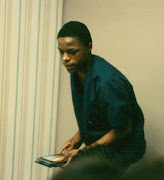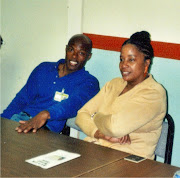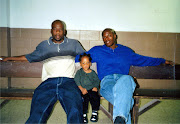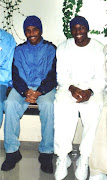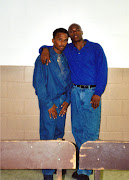Barry Massey
 Barry Massey
Barry Massey
13 yr old student with a mental capacity of a 9.9 year old sentenced to natural life in prison.
Barry Massey is the youngest man in U.S. history to be tried, convicted and sentenced to Life w/o Parole. He applied for clemency October 2006, and the WA. State Clemency & Pardons Board voted 4-1 in favor of Barry’s release after serving over 20 yrs. in prison. However, in March 2007, Gov. Gregoire rejected her Board’s recommendation and denied Barry’s release from prison.
Barry was convicted & sentenced to Life w/o Parole at age 13. He has served 23 consecutive yrs in prison. Barry was placed in WA. State prison before he made it to High School.
-Life without parole for children is inhumane!
-All forensic Evidence points to co-defendant as principal actor
-Barry falsely confessed (statements inconsistent with facts)
-The Prosecution called Barry’s confession “unreliable” in co-defendants trial!
-Unprecedented DOC officer support, 14 staff wrote and 2 of them testified in support of clemency for Barry against DOC policy!
CALL : 1-360-902-4119
State your support for Gov. Gregoire to grant Barry Massey clemency, and request that she follow the recommendation made by her Clemency & Pardons Board
Trading Boyhood For Bars
At the age of 13, while his peers were dealing with the rigors adolescence, Barry Massey began serving a life sentence for murder.
Once or twice every other week, Barry Massey, 30, casually strides down a long hallway lined with bright, colorful murals. At the end of the hall, he along with the painted murals of fish and Disney characters, enters a room full of tables surrounded by people talking to their family and friends. Barry glances around the room and quickly finds his mother seated at one of the wooden tables near the corner. As he walks toward her, she stands up and the two hug.
For a couple of hours they sit across from each other, talking about family and friends; they discuss what each has been doing since their last visit. Sometimes they play cards or get a snack from the vending machine. When their visit is over they stand up, hug and say goodbye. Diann Massey, Barry’s mother turns around, with many other mothers in front and behind her and leaves her son in the Monroe, Washington State Reformatory’s visiting room, just as she has done for the past 17 years.
In 1987, at the age of 13, Barry became the youngest person in Washington State history to be sentenced to life in prison without the possibility of parole.
Today, nearly two decades later, the ruling still stands, “I was so young (at sentencing) that I couldn’t really fathom what had happened to me,” Barry said.
Barry spent the first 13 years of his childhood like most other children. He was born into a hardworking, middle-class family in Tacoma and attended school until sixth grade. He loved sports – football especially. He rode his bike up and down the neighborhood streets and spent the night at friend’s houses. He also began experiencing “puppy love” as he called it. Like many 13-year-old boys, he wanted to be a professional football player when he grew up. Barry said his bedroom walls and school lockers were plastered with pictures of professional athletes.
“I just wanted to play football,” Barry said. “I had no desire to do anything else.”
Until December 1986, Barry had never been in trouble.
“He was a good kid,” Diann said. “He played sports, and all the teachers liked him.”
However, Barry said, looking back, he believed he was not receiving enough attention at home and began spending time with 15-year-old Michael Harris, his older brother’s friend, who had a criminal record.
Despite the warnings Barry received from his mother about hanging around Harris, Barry continued.
“It was a mother’s instinct,” Diann said. “I knew the second I met him.”
In December 1986, Barry and Harris burglarized a house on Harris’ paper route. What they stole would greatly affect the rest of their lives, not to mention many others.
“He only knew him for one week,” Diann said.
On January 10, 1987 Barry and Harris attempted to rob a marina market owner by Paul Wang. Barry said he was going to use the money to buy candy and Garbage Pail Kids.
“A lot of kids suffer from peer pressure,” Barry said. “Kids are not bad; pressure from your peers convinces you to do things that you wouldn’t normally do. We all do this in our lives. My situation was way worse than most. There was never any intent to harm anyone. We didn’t want anyone to get hurt.”
One of the boys, Michael Harris, shot Wang, a husband and father of two, twice with a gun that had been stolen the month before and stabbed him seven times. Barry and Harris were tried and convicted as adults for aggravated first-degree murder.
Now, at 30-years-old, standing 6 feet 2 inches tall and weighing 210 pounds, Barry’s body may look to be one of a stereotypical inmate. His frame; pecs, abs and arms are chiseled from 17 years of virtually unlimited time in the weight room. A few tattoos cover his dark brown skin, including the one on his left pecs, that reads his mother’s name, Diann.
His face however, is almost that of the 13-year-old he left in Tacoma, yearning for candy and Garbage Pail Kids. His smooth skin, eyes so dark the pupil is barely noticeable and perfect smile convey an image of innocence; one which would make it hard for anyone to see him as the monster some may believe him to be.
He can easily stand in the middle of his six-by-ten foot cell and touch both walls without fully extending his arms. Crowded in this space, which is the same width and only three feet longer than a king size bed, there is a metal bunk, a desk, a toilet and a built-in stool. Other amenities such as a television, radio and a typewriter area available, but they cost close to double what they would outside the prison.
Washington State law says that children younger than 8-years-old are incapable of committing a crime and children younger than 12 must have a competency hearing before they are charged. Children 13 to 17 may be tried as a child or as an adult, depending on the seriousness of the crime.
According to an Oct. 5, 2000 Seattle PI article, despite Barry having the mental capacity of a 10-year-old, an IQ indicating he was borderline mentally handicapped and reading and math levels of a third-grader, psychologists decided in a competency hearing that Barry was competent enough to be tried as an adult.
Barry and his family were unable to afford a lawyer, so one was appointed to him. It turned out to be his basketball coach, a lawyer, who had never tried a case in court.
Originally, after sentencing, Barry was sent to Washington Correction Center in Shelton. Because he was so young, no one knew what to do with him, and he ended up spending most of his time in seclusion. After complaints by his mother about his isolation, Barry was transferred to Washington State Reformatory in Monroe. For a short time, Barry was sent to Walla Walla State Reformatory, however, he has been in Monroe the majority of his sentence.
Barry said that in Monroe he became somewhat of a novelty among older inmates and they sheltered him from abuse.
“A lot of older guys in here were mentors to me and helped me out,” Barry said. “I spent three or four years with one mentor. He got me reading and into school.”
In the beginning, however, he said he would get into fights trying to prove himself.
“I was so young and unconscious to my life in general,” Barry said. “I was unconscious to what I was missing. When you haven’t experienced something, you can’t miss it. I didn’t miss my freedom, my friends. I didn’t miss the mail or the ice cream shop or the movies. I never experienced any of them.”
In order to get through the tough years of puberty and the beginnings of becoming a man, Barry said he threw himself into physical activity.
“At that stage my mom would come up and visit all the time and I would just play sports,” he said.
Barry’s father also came up to visit frequently in the early years; however, Barry says he is and always has been closer to his mother.
Since then Barry has grown up inside the prison walls. He has never had the opportunity to drive a car, go grocery shopping for himself or even attend a school dance. He has never listened to a CD or seen a DVD; things people take for granted.
Barry said that since the age of 18 he has taken it upon himself to pass the General Educational Development test. He is involved in many programs within the prison, such as Youth and Consequences, where he speaks to troubled youths about life in prison, The Black Prisoners Caucus and the Prisoners Awareness Program.
“If I could take it all back, I wish no one would have gotten hurt,” Barry said. “But the growth that I have experienced made me a better person, something that I would have never been. I love who I am now. I broke my mom’s heart when I came here. For a lot of years she was emotionally broken. I didn’t understand until I was 25 or 26. I didn’t understand because she was there and she was a strong woman, but for a long time she was emotionally broken.”
If he was not in prison, Barry said he believes he might be playing sports right now.
“I was pretty good when I was younger,” he said. “I think I would have gone to college and got my education. But I could have been nothing. You never know.”
Barry now has a job making $8 an hour as a metal fabricator inside the prison. While working, he wakes up at 6:30 a.m. every morning to eat breakfast, works from 7:30 am until 3:30 p.m., had dinner at 4:30 p.m., after which he goes to the gym for a couple of hours. However, once 8:15 p.m. rolls around he must be back in his cell for the rest of the night, where he reads or writes letters until he goes to sleep.
“You can read or watch TV all night if you want,” Barry said. “I don’t watch TV, though because it’s a waste of time.”
When he is not working, Barry’s schedule is more open. He said he usually goes to the gym in the morning, takes a shower and then reads or takes a nap. After lunch he will either go to the library or see if there is any extra work available.
Up until a couple of months ago, Barry said he did not always sleep through the night.
“I used to have nightmares really bad,” Barry said. “I think that they were about getting out ‘cause I would wake up in the middle of the night, shaking the bars of my cell.”
As of now, Barry’s sentence still remains life without the possibility of parole. However, he is always in contact with the lawyers now representing him, regarding appeals.
If he were to get out, Barry said he knows exactly where he would go.
“I would visit my grandma,” he said. “She hasn’t visited me in a while because she’s been sick. My mom doesn’t come up as much either because she is my grandma’s primary care-taker.”
Barry said he would like to have a job involving physical fitness, if he ever does get out.
“Physical training is important to me,” he said. “It has helped me maintain my sanity. I would like to do something like that, whether old. He said be personal training or just working at a gym.”
Barry said he will be the first to admit that he made a terrible mistake when he was 13-years-old. He said he has done more with his life in prison than he would if he was on the streets. He continues to work at improving body.
“If I do get out, I’m going to be prepared,” Barry said “I don’t want to get out and not know what to do”.
Story written by: Jessie Bowden
14-YEAR-OLD HIT WITH MURDER CHARGE IN STORE OWNER'S SLAYING
Thursday, May 28, 1992
The last time prosecutors tried anyone that young for murder in adult court was when Brooks Wilson Trew was charged with the July 13, 1986, slaying of Kevin W. Wisman, a 27-year-old Lake Forest Park resident.
Trew was 13 when he took a pistol, put it to the back of Wisman's neck and pulled the trigger while the victim was lying face-down in his bed. He was 14 when he pleaded guilty to second-degree murder in adult court and was sentenced to four years in an institution.
Pierce County prosecutors also tried a 13-year-old as an adult in a murder case several years ago. Barry Massey was sentenced to life in prison without hope of parole after being convicted of aggravated first-degree murder in the Jan. 10, 1987, shooting and stabbing death of Paul Wang, owner of a Tacoma marina.
Michael Harris, who was 15 at the time of the crime, also was tried as an adult for his role in the robbery-murder and got an identical sentence.


